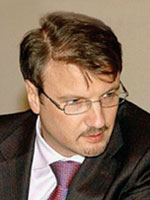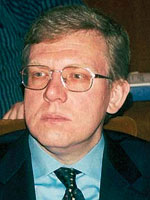|
Vol. 226 No. 2 |

|
 |
| JACQUES SAPIR, CONTRIBUTING EDITOR, FSU |
Yukos goes to auction. Who’s next? The auctioning of the most important Yukos subsidiary, bought by the then unknown Baïkal Finance Co., means that a decisive turn has been taken. The ferocious feud between the once flamboyant Yukos oligarch, Mikhail Khodorkovsky, and the Kremlin has entered its final stage. It is not difficult to understand who has won.
Still, the Yukos case was a sideshow in Moscow. People who have either money or power, or both, point to more important news. The first item is the keen interest shown in mid-December by the Federal Tax Administration in the VimpelCom Co., accused of tax evasion on a massive scale – the telecom business is now in hot water.
But a less publicized event was also attracting attention. Publication by late November on the federal Accounts Chamber (audit court) website of the long-awaited report on privatization (done between 1993 and 2003) has spawned much commentary and gossip1. This report makes it plainly clear that Russian capitalism rests on dubious, if not plainly criminal foundations. This is not really breaking news. What is different, is to see what most Russians have been thinking for years, written up officially by one of the country’s highest legal authorities.
The third important item is that economic growth is slowing. Russian growth had been fast after the August 1998 crash, partially attributable to booming oil and gas exports. However, growth has also been the direct result of the massive currency devaluation, and of sound stabilization policies, implemented first by Primakov’s government and then followed by Putin’s regime. It is now clear that if growth is to be kept at the high level that Russia needs, then a more vigorous economic policy is needed. The fact that both officials in charge of economics, Minister of Finance Alexei Kudrin and Minister of Economic Development & Trade German Gref, have not been up to this task so far, is well known in Moscow.
 |
 |
Further expansion of Russia’s oil sector requires more creative policy from Minister of Economic Development & Trade German Gref (left) and Minister of Finance Alexei Kudrin (right).
|
|
The main question now is which direction will President Vladimir Putin take. His first term has focused largely on making clearly contradictory trends compatible. Putin has tried to persuade Russian society – and maybe himself – that one could break with the worst of Yel’tsin’s legacy while keeping the liberal reform spirit alive. He also tried to make a more active social policy possible while keeping the tax burden as light as possible, without any budget deficit.
After the end-of-the-1990s turmoil, there was some merit in such a policy, but since early 2003, limits could be seen. The offensive against Yukos and Khodorkovsky cannot be understood out of its political context. The aim was not to destroy the business, itself, but the oligarchial system as a state within the state. In other words, a shadow government endowed with as much, if not more, power than the legal one.
The practice of keeping taxes low, but asking large companies to fund much of the educational, health and cultural agenda, has created a two-tiered, public finance system. Some oligarchs have bent not to their “patriotic” duty, but to the direct pressure of people linked to security agencies, known as “siloviki.” This does not speak well for creation of a transparent government.
Last, but not least, several developments – bad economic results last fall, low levels of long-term investment, underdevelopment of public utilities – are showing that rebuilding the country cannot be done by relying on raw-material rent and liberal-minded economic policy. There is no doubt that very important choices have to be made.
Staying in his first-term mode will be fraught with danger for Putin. His public rating now suffers, not because most Russians think he is too authoritarian (as the West sees him), but because people think he is not strong enough (imagine that!). Recent successes of the new “social-patriotic” Fatherland Party should be noted.
Such successes are not gained against the Communists, who are strong in the polls, but against United Russia, the so-called “party of the President.” To call a group known for its absence of programs and ideas – as well as widespread corruption – a party, is a joke. Not that one can find many bright people in United Russia’s membership. But the lack of clear intellectual foundations, itself a result of Putin’s political compromises, has turned what could have been a large, center-left party into a fragmented political machine.
Moreover, the oligarchs are not “playing ball.” They did not respond to Putin’s attempt to foster a political synthesis by breaking away from their short-term, predatory behavior. The manner in which another Russian oil giant, Lukoil, has managed development of export facilities on the Baltic coast is one example. Lukoil wanted to develop a new oil terminal at Vysotsk, not far from St. Petersburg. Yet, the whole idea has turned into an ecological nightmare, raising more-than-justified Finnish fears and EU opposition. This is not what Russian officials needed at this stage of negotiations with the EU.
Changes are coming, probably by late winter or early spring. One should not be surprised if Western media begin to talk about “re-Sovietization of Putin’s Russia.” The real thing, however, is quite different. Putin chose to not level the playing field when he was elected in 2000. But a modern country cannot grow up on just Yeltsin’s legacy. What had to be done is to be done. Some heads are going to fall – who’s next? 
Jacques Sapir is professor of economics at EHESS-Paris and at the Higher School of Economics in Moscow. He is a regular contributor to this column.
|








